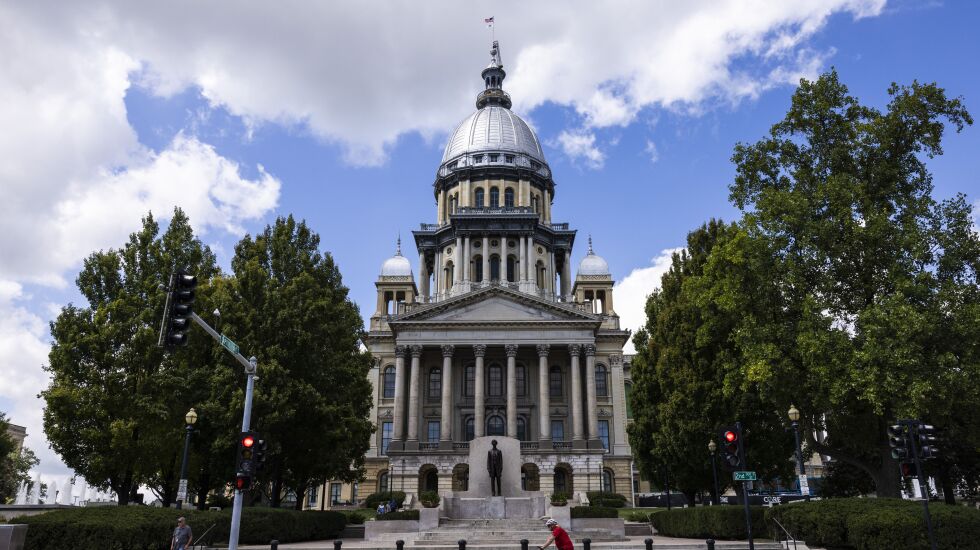
A heated battle over tax credits for private school scholarships, lifting a moratorium on new nuclear power plants and an elected school board map for Chicago are among the most pressing issues facing lawmakers as they return to Springfield on Tuesday for the final week of veto session.
As Senate Republicans continue to pressure Democrats and Gov. J.B. Pritzker to extend the Invest in Kids program, seven congressional Democrats on Monday joined the fight against it.
The program provides a tax credit of 75 cents for every $1 donated to fund scholarships for Illinois students from low-income families to attend private schools. It will end on Dec. 31 if lawmakers do not extend it.
U.S. Reps. Jan Schakowsky, Nikki Budzinski, Sean Casten, Danny Davis, Jonathan Jackson, Raja Krishnamoorthi and Delia Ramirez wrote “school vouchers ... perpetuate and deepen the education inequities that plague Illinois.”
They also took issue with religious groups using public dollars.
“This program diverts public funds from the public school system to be used to pay for tuition at private and religious schools,” the lawmakers said in the statement. “Furthermore, many of the schools funded by the program have policies that openly discriminate against students on the basis of disability status, gender identity, sexual orientation, if they are pregnant or parenting, or immigration status.”
Senate Republicans dispute that narrative as they continue to try to save the program. Senate Republican Leader John Curran, R-Downers Grove, planned a Tuesday morning news conference in Springfield to urge Democrats and Pritzker to reconsider.
Curran has argued the program has not taken money away from public education, and he supports a compromise that would lower the total donations eligible for tax credits from $75 million to $50 million. He has also railed against the ideological fights over the program, arguing the children benefiting from it should be guaranteed the certainty of a permanent program.
Advocates say about 9,500 students from low-income families are at risk of losing their private school scholarships.
Pritzker in October got the ball rolling on the tax credit fight when he told reporters he would support an extension if it made its way to his desk. During his first campaign, Pritzker said he opposed the program. The Chicago Teachers Union and the Illinois Education Association ramped up their criticism of the program after the governor’s comments appeared to open a door to a potential extension.
Legislators also plan to try to approve an elected school board map that will divide Chicago into 20 districts. Lawmakers last week released their third revision of the map, aimed at reflecting the voting population within that reflects the minority-majority school district.
The map, which will still need the governor’s approval, must be finalized by April 1. The elected school board will begin serving in 2025, with 10 members to be selected in the November 2024 election, and another 10 members and a school board president appointed by Mayor Brandon Johnson.
The new map has less majority-white districts than previous maps and more districts where Latino Chicagoans are either the majority or a plurality. And while there seems to be more agreement about the maps, the House and Senate are still negotiating issues related to the measure, including how members would be appointed.
State Sen. Sue Rezin, R-Morris, also plans to file a measure to counter Pritzker’s veto of a bill that would have lifted a moratorium on new nuclear power plants in the state.
The governor in August vetoed the moratorium lifting, writing it did not provide regulatory protections for the health and safety of Illinois residents, and there was an “overly broad definition of advanced reactor” that could open the door to large-scale nuclear power plants. Environmental groups like Sierra Club and the Illinois Environmental Council had asked for the veto.
But Rezin on Monday said she believes her new measure addresses the governor’s concerns. She said she is in talks with Senate President Don Harmon, D-Oak Park, and plans to introduce the measure as soon as possible. There are also other proposals in motion, including in the House.
“I would say that this compromise narrowly defines new nuclear down to the actual megawatt, as opposed to the amended version that he vetoed in the House that used the federal definition of new nuclear,” Rezin said. “So this new version is more specific, limiting the size by dividing the megawatts in the nuclear reactor.”







